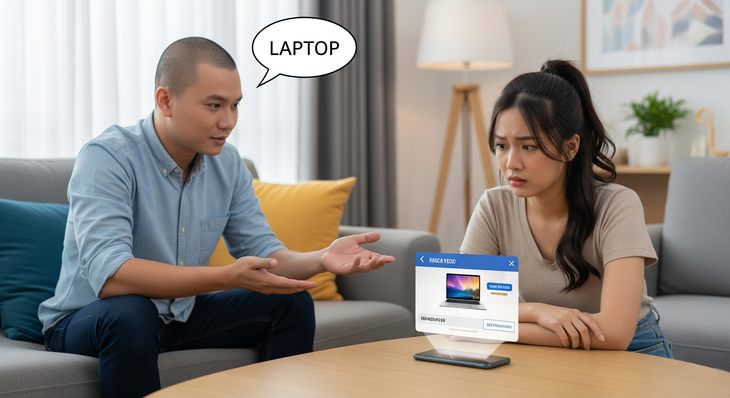
Just finished talking about laptops and immediately saw laptop ads...
Have you ever wondered why you just talked about a product, then when you open Facebook you immediately see an advertisement for that product? Is it because your phone is listening in on you, or is there some "force" behind it?
Why you get 'no miss' ads
The first thing to note is that it’s no coincidence that you see an ad for exactly the item you’re looking for. While many people still suspect that phones are listening in, the truth is much more complicated. Instead of listening to conversations, big tech platforms are using something even more powerful: behavioral data. And in the digital world , every click or like can be used to… guess what you’re thinking.
In theory, apps can access microphones if users grant permission. However, there is no clear evidence to date that major platforms like Facebook or TikTok use microphones to "eavesdrop" on users for advertising purposes, partly because of legal concerns and partly because it is unnecessary.
Instead, they rely on a wealth of other data to target ads so precisely that many people mistakenly think someone is listening.
Users' personal data does not come from far away but is collected from daily digital activities, including:
Browser search history , like when you search for "laptop for online learning", the system can quickly identify the need and push corresponding product ads everywhere you surf.
The apps you have installed, especially if they belong to the same ecosystem, can also share information with each other, thereby helping the system paint a detailed portrait of you: what you care about, what you like, what you will need soon.
Location data and travel history are also important clues. If you frequent the supermarket every night, getting a promotion right when you get off work is no coincidence.
Online habits, from the posts you like, the pages you follow, to the videos you stop watching longer than usual, are all analyzed and fed into behavioral prediction algorithms.
Notably, today's technologies heavily exploit "contextual data" - that is, based on your behavior, the content you are exposed to, the people you interact with, or the events happening, the system can "infer" what you are interested in. Without having to listen to you, ads can still appear... incredibly timely.
Beyond the technicalities, the feeling of being “eavesdropped on” sometimes comes from the way the human brain works. A common psychological effect called “confirmation bias” makes it easier for us to remember the right time for an ad, like when we talk about a massage chair and then see it pop up on Facebook. But conversely, we easily ignore the countless times we talk about something without an ad appearing.
It is this selective memory choice that leads many people to believe that their phones are actually tracking them. The feeling of “suspicious coincidence” becomes evidence, even though there is no certainty in reality.
As advertising platforms get smarter, their predictions are more likely to coincide with real demand, inadvertently reinforcing the belief that “they’re listening in on me.”
How to control and protect yourself
While tech platforms deny that they eavesdrop on microphones, protecting privacy is still an important thing that every user should take proactive steps to do. Here are some simple but effective steps you can take to control and limit the collection of personal data:
Check app access to microphone, camera, location
Regularly review the list of apps on your phone to see which ones have permission to use your microphone, camera, and location. On iOS and Android, you can manage this access in your privacy settings.
If you see unnecessary apps still having permissions, disable them immediately to limit the possibility of unwanted data collection.
Turn off "Personalized Ads"
Most major platforms like Facebook and Google allow users to turn off or limit personalized ads. You can access your Ad Settings to minimize the system's use of behavioral data for ad targeting.
While it won't eliminate ads completely, this step will help reduce annoying "mind-reading" ads.
Limit sharing of personal data between apps
Multiple apps within the same ecosystem often share data to improve advertising effectiveness. You can review data sharing or account linking permissions and limit these permissions.
Also, be careful when logging into apps with your Facebook or Google account, as this makes it easier to collect synced data.
Use tracker blockers and secure browsing
Tools like ad blockers and tracker blocking software help reduce data collection when you surf the web or use apps. Additionally, using secure browsers like Brave, Firefox Focus, or incognito mode also helps protect your privacy, limiting the ability of websites and services to record your behavior.
Keep your software and device security up to date
Regularly updating your operating system and applications not only improves performance but also patches security holes, preventing attacks or exploitation for tracking and eavesdropping.
Technology isn't magic, but it does know more about you than you might think. Increasingly sophisticated data collection and analysis systems bring great convenience, but they also pose huge privacy challenges.
Being vigilant about your personal data is not paranoia, but a smart and necessary choice in the digital age. Stay alert, protect yourself with simple but effective measures to take advantage of the benefits of technology while preserving your precious private space.
Source: https://tuoitre.vn/dien-thoai-nghe-len-ban-nen-quang-cao-khong-trat-phat-nao-20250529011653951.htm

































































































Comment (0)